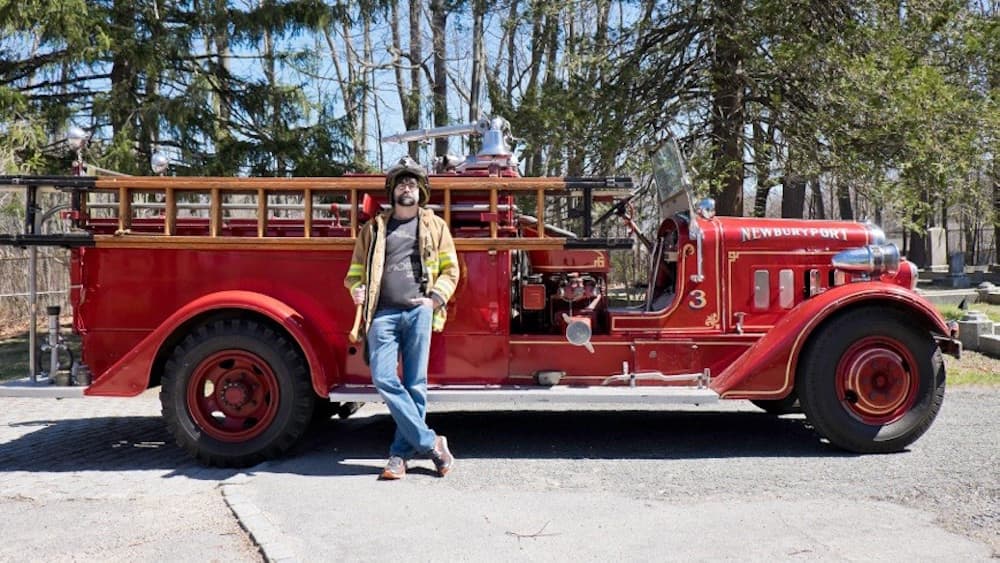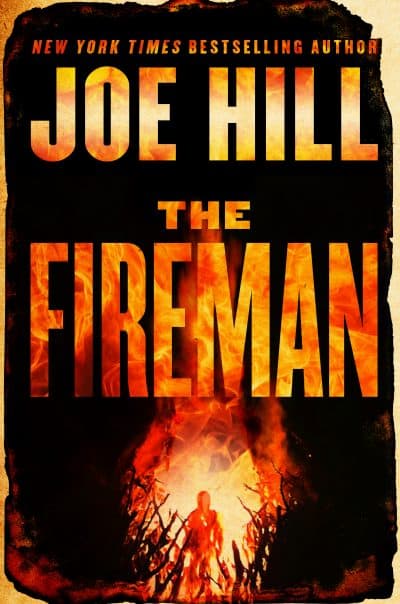Advertisement
Joe Hill's 'The Fireman' Finds Hope In A Fiery Apocalypse

George Clooney is dead. But don’t cry for him. Well, not for him specifically. He’s just one among the millions of recently deceased people across the world, unfortunates who have spontaneously combusted into flames after contracting a mysterious virus.
This is the post-apocalyptic, near-future world that novelist Joe Hill plunges us into as “The Fireman,” his latest doorstop of a book, commences. It’s a horrifying scenario, especially when it seems there’s no relief from the pandemic people call Dragonscale. (Doctors refer to it as Draco Incendia Trychophyton.) The disease first presents itself on the body as black-and-gold lines and curlicues. If infected, it’s not a question of if you light up, but when. And if you don’t have Dragonscale, you want to stay as far away as possible from those who do. Or perhaps, hunt them down and kill them before they can infect you.
And yet, “My running joke about ‘The Fireman’ is it’s the sunny side of apocalypse,” says Hill, on the phone from his seacoast New Hampshire home. “What I really mean by that is usually when we get a story of dystopia or a story of the last days, there tends to be real wallowing in man’s brutality against man, the civilized reverting to a type of animalism. Grown-ups will trample a child and bite a child’s throat out for the last can of beans and then furtively scamper off into the ruins.” As in Cormac McCarthy’s “The Road” or, Hill adds, “The Walking Dead’ and “The Hunger Games.”
But in “The Fireman,” we meet a band of survivors who’ve clustered together at a hidden camp. Provisions are scarce, and secrecy a must, but hope does not die. They’re turning this Dragonscale thing around. They call themselves The Bright. It is where the heroine, nurse Harper Grayson, finds herself after fleeing her murderous husband and then being rescued by a mysterious Brit, John Rockwood, aka the Fireman. The Fireman has learned, as have members of the Bright, how to channel this virus, use the disease and its firepower to create positive energy (or destroy enemies).
Say this about 21st century pop culture: It’s always apocalypse now. “The apocalypse is sort of the ‘in’ genre,” Hill says, noting the difference between life and art before and after 9/11. “But our fascination with the end of the world is not particularly new. There were a lot of great apocalyptic stories in the ‘50s, probably warmed up by fears of nuclear annihilation.”
“The Fireman” gestated in Hill’s head a few years ago during a spate of Texas wildfires. “What occurred to me was a contagion. What if the match that kept lighting these fires was us? So I came up with the idea of a plague of spontaneous combustion.” As nasty as things are, the philosophy underpinning “The Fireman,” Hill says, comes from poet Jack Gilbert’s “Briefs for the Defense.” “Gilbert talks about how important it is for human beings to experience and to feel joy, not in spite of the horrors the world has to offer but because of the horrors of what the world has to offer. He talks about how a starving baby will stop crying and turn its head when he hears the women laughing by the well.
“Our empathy, our sense of humor, our desire to care for each other, to make love, to be kind, to share happiness --those are not things we would abandon in the first pinch of a crisis. There’s a part of me that believes in a crisis, those qualities could just as easily amplify us as a race. That’s something I wanted to explore. You have this main character, Harper, who in spite of it all, is this relentlessly hopeful, decent, warm, affectionate person — her optimism is the immovable object that stands against the unstoppable force of this global pandemic.”
Hill — who’s written a collection of short stories, three novels and one graphic novel — is the 44-year-old son of Stephen King. It’s a fact Hill — born Joseph Hillstrom King — kept hidden for about a decade as he strived to make his way as a writer, not wanting to trade on his father’s fame or connections. “I love my dad and I love my dad’s work,” says Hill, who grew up in Bangor, Maine and has lived on the New Hampshire coast for 15 years. “I am a Stephen King fan. When I chose the pen name I said ‘I’m going to keep the secret for about a decade while I work on short stories, some novels’ (I was never able to sell). What I really lacked was self-confidence. I was insecure and the pen name remained almost hermetically sealed long enough for me to build up my courage and develop my craft. I really got what I wanted out of it. “Now that it’s my professional identity, and for the reasons I just said, I like keeping it around. The thing that has changed is so many of my books are celebrations of other stories that I love — movies to novels to TV — there’s so much [of that] I reflect on in my own books, it would be weird for me not to do that with my dad, too, considering how much I love those stories.”
Readers may find parallels to King’s “Firestarter” and “The Stand” in “The Fireman.” Even “The Shining,” as Hill’s characters “shine,” just in a different way from King’s. Father and son both have a flair for horror and fantasy, and both often set stories in New England climes. They also share a fondness for telling long tales. The subject is slyly referenced early in “The Fireman.” Harper explains why she’s been reading Thornton Wilder’s “The Bridge of San Luis Rey”: “Partly because it’s about why inexplicable tragedies occur, but also it’s short. I feel like most folks want a book they feel like they have time to finish. You don’t want to start ‘A Game of Thrones’ when you might catch fire all of a sudden.” Hill laughs. “This is a line in a book that’s 760 pages long,” he says. “I was making fun of myself. The thing about a big long book is the longer it is, the more you have to feel like the pages are really flying.”

Most authors, when asked about television or movie adaptations of their books, will answer along the lines of “I write the books and if someone wants to make a movie or TV show, let ‘em at it.” Not Hill, not this time, at least. “I constructed ‘The Fireman’ like a prestige cable TV show. I was thinking about stuff like ‘The Americans.’ ‘Breaking Bad’ and ‘Fargo.’ There’s been some very literary, very novelistic work done. It feels like about five or six years ago certain showrunners and certain cable networks began to try and craft novels for TV. And now the door is starting to swing the other way and I think the novelist is trying to construct an experience on the page that resembles one of these very tightly controlled 12 or 13 episode cable TV shows.”
“NOS4A2,” Hill’s previous novel, is in development with AMC and Fox has finalized a development deal for ‘The Fireman.” But is it good to have a potential adaptation in your head when you’re writing? “Well … no, not really,” Hill says. “I think if you’re writing to be adapted into another form, you’ll probably wreck the project before you’ve even begun. It’s great that ‘Harry Potter’ exists as these wonderful movies and terrific video games, but all of that is because the novels themselves are so satisfying. The novels couldn’t be a platform for those other things. They have to succeed on their own merit before anyone can go onto other projects. But you are what you eat. And so having absorbed the structure of a number of these shows, I think it was kind of inevitable that almost unconsciously some of that structure would be reflected in a book that is big, but is essentially constructed as nine very distinct episodes. And one is kind of a double episode, like a two hour finale.”
Hill, like most writers in his field, is always asking readers to take a big gulp of believability. "I try my best to make it not very far-fetched,” he says, with a laugh. “I mean the funny thing is I’ve written three supernatural novels before this. I wrote a book about a guy who buys a ghost online, I wrote about a guy turning into a devil and I wrote about a dude who has a car that runs on human souls instead of gasoline. And so, when I did this [book], it certainly didn’t seem any more outrageous than any of my other concepts.”
As to the science, Hill says, “I was able to construct a spore, my pathogen, the Dragonscale, where everything it does can be found to some degree in nature. There is no fungal infection that will cause you to spontaneously combust. But, really, everything it does is only slightly exaggerated from what’s really out there.”
Hill reads with horror and dark fantasy writers Thomas Olde Heuvelt, Kat Howard, Josh Malerman and Paul Tremblay at Brookline Booksmith Monday, July 11 at 7 p.m.
